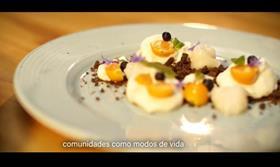
The Colombian Government has teamed up with British botanical research institution Kew Gardens in a project to explore and understand the importance of Colombia´s indigenous plants and fungi in improving people's lives and promoting bioeconomy through the sustainable use of biodiversity.
To showcase the project, the Colombian Embassy in the UK hosted a culinary masterclass featuring Colombian chefs Antonuela Ariza and Eduardo Martínez, who prepared an innovaive menu based on native ingredients.
The tempting menu consisted of white fish ceviche and chontaduro, a type of palm fruit; lamb chops with borojó, an aromatic tropical fruit from the rubiacae family, and Guaímaro soil with goldenberries and copoazú.
Tatiana Rojas, lead researcher of the Useful Plants and Fungi of Colombia project at the Humboldt Institute was also on hand to outline the characteristics and uses of these plants.
Colombia is the second most biodiverse country in the world and is home to some 26,000 plant species.
“Through joint field work, British and Colombian scientists are developing pioneering work to protect biological assets and help local communities use nature for sustainable economic gain,” the Embassy said.
“This initiative demonstrates our commitment to protect the environment and promote sustainable livelihoods.”



